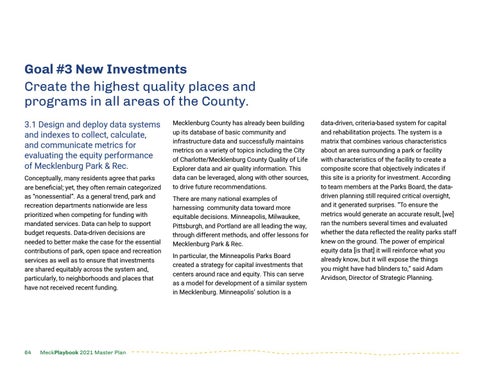Goal #3 New Investments Create the highest quality places and programs in all areas of the County. 3.1 Design and deploy data systems and indexes to collect, calculate, and communicate metrics for evaluating the equity performance of Mecklenburg Park & Rec. Conceptually, many residents agree that parks are beneficial; yet, they often remain categorized as “nonessential”. As a general trend, park and recreation departments nationwide are less prioritized when competing for funding with mandated services. Data can help to support budget requests. Data-driven decisions are needed to better make the case for the essential contributions of park, open space and recreation services as well as to ensure that investments are shared equitably across the system and, particularly, to neighborhoods and places that have not received recent funding.
64
MeckPlaybook 2021 Master Plan
Mecklenburg County has already been building up its database of basic community and infrastructure data and successfully maintains metrics on a variety of topics including the City of Charlotte/Mecklenburg County Quality of Life Explorer data and air quality information. This data can be leveraged, along with other sources, to drive future recommendations. There are many national examples of harnessing community data toward more equitable decisions. Minneapolis, Milwaukee, Pittsburgh, and Portland are all leading the way, through different methods, and offer lessons for Mecklenburg Park & Rec. In particular, the Minneapolis Parks Board created a strategy for capital investments that centers around race and equity. This can serve as a model for development of a similar system in Mecklenburg. Minneapolis’ solution is a
data-driven, criteria-based system for capital and rehabilitation projects. The system is a matrix that combines various characteristics about an area surrounding a park or facility with characteristics of the facility to create a composite score that objectively indicates if this site is a priority for investment. According to team members at the Parks Board, the datadriven planning still required critical oversight, and it generated surprises. “To ensure the metrics would generate an accurate result, [we] ran the numbers several times and evaluated whether the data reflected the reality parks staff knew on the ground. The power of empirical equity data [is that] it will reinforce what you already know, but it will expose the things you might have had blinders to,” said Adam Arvidson, Director of Strategic Planning.



















